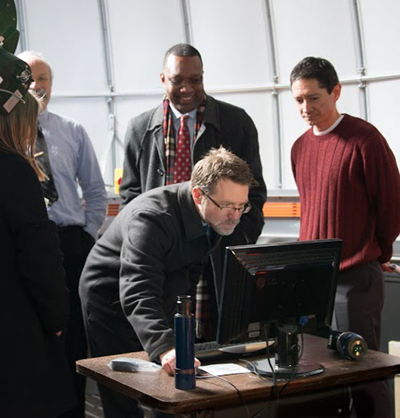February 2015
Carl Sagan observed that “our species needs, and deserves, a citizenry with minds wide awake and a basic understanding of how the world works.” Taking on this often Herculean task, Matthew Pappas, associate professor of earth and space science, has been teaching astronomy as a full-time faculty member in the earth and space sciences department for the last 15 years. Matt got his start tutoring mathematics in high school and that is where his love of teaching began. Though he went to college and graduate school (UMass Dartmouth and Wesleyan University) concentrating in science, Matt was fortunate to go to schools that emphasized the importance of being good teachers. Matt was also actively involved in public outreach during that time as well. Matt has consistently kept his teaching at the forefront of his professional career, developing research-based science lessons and activities as well as attending numerous pedagogy workshops. Matt’s favorite course to teach is AST103: Search for Life in the Universe. Of all the interesting topics in astronomy, nothing grabs the attention of his students more than the prospect of aliens living out there in the universe. In fact many of his students have their own preconceived notions about the existence of aliens, some of whom are ready to debate the issue on the first day of class (the students, not the aliens). When students come to class with such great enthusiasm, they’re willing to invest more in the class, which makes for a much more effective and enjoyable learning experience. Matt finds astronomy to be a fascinating science, but he feels the results that astronomers report are rarely practical. For example, it may be fun to debate whether or not Pluto is a planet but a highly effective cancer treatment is going to impact more people in a direct way. Science and technology is an ever-increasing part of our daily lives, and Matt believes it’s important for his students to be able to think critically about the advancements made in those fields. In the coming years issues like space exploration, climate change, drone technology, and stem cell research are going to impact our lives dramatically. The best way to describe his goal as an educator is the metaphor of an artist. The reason he practices his pedagogical “art” is to help students understand the basic scientific concepts that underlie those issues so they may make more informed decisions at the voting booth or in their personal lives. Matt’s medium is science; his passion, astronomy. Matt’s students often come to his class with the impression that science is all about knowing the right facts about nature. In actuality science is about discovery, which means that finding out the wrong answers is just as important as finding the right ones. Matt emphasizes that understanding how astronomers go about arriving at their conclusions is just as important as the conclusions themselves. After the semester ends it’s not uncommon for students to tell Matt they enjoyed the course and that they learned a lot, regardless of their final grade. Recently, a student wanted help understanding some of the scientific concepts he was looking to use in a science fiction novel he was writing. Matt spoke with him for about an hour and as he was leaving he expressed his gratitude for taking the time to explain the science to him rather than dismissing his ideas out of hand even if they weren’t scientifically accurate. Matt’s professional interests tie in to the movies and TV shows he tends to watch, which gives him an opportunity to connect with students on a different level. Movies like Back to the Future and Bill and Ted’s Excellent Adventure as well as some episodes of Family Guy allow Matt to address ideas about time travel, Interstellar offers an opportunity to talk to students about the possibility of using black holes for space travel, and Armageddon opens the door for discussing the likelihood of Earth being hit by an asteroid and evaluating different defense strategies. In terms of his service to the FA as an EC rep, Matt has gained a greater appreciation for the role the FA plays in getting the college to operate at such a high level. Matt feels that the men and women who volunteer their time to the FA work hard to ensure that our faculty have the opportunity to advance their professional careers which helps faculty ensure a high quality education to the residents of Suffolk County. Looking toward the future Matt is exploring a group research project in AST103 that is designed in a way so that students develop skills that they can use in their chosen careers such as doing research, delivering oral presentations and working in groups. The one class he’d really like to develop in the near future is a course on exoplanets. Exoplanets, planets orbiting stars other than the Sun, have been a major area of research since he was an undergraduate. The construction of the new observatory on the Ammerman campus has generated a significant increase in the number of students interested in becoming astronomy majors, so Matt would like to establish the observatory as the focal point for the astronomy program so that future majors can develop their research skills prior to moving on to a bachelor’s degree. Matthew Pappas and his students are boldly going where no SCCC astronomy class has gone before. |

